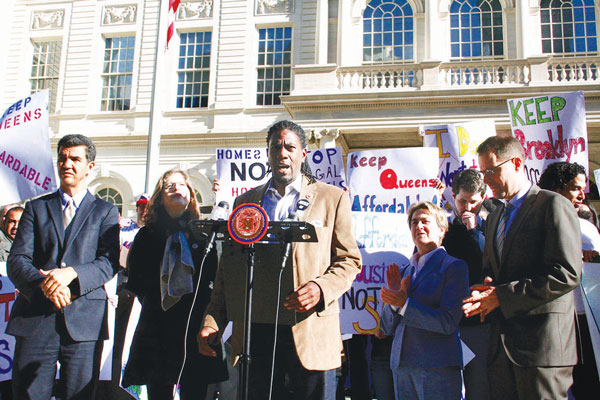
Joined by tenant activists at a City Hall press conference last week, politicians said Airbnb must be held accountable, from left, City Councilmembers Ydanis Rodriguez, Helen Rosenthal and Jumaane Williams, Assemblymember Deborah Glick and Councilmember Mark Levine.
BY YANNIC RACK | In a war of words at City Hall last week, Airbnb once again clashed with its critics, who accused the popular short-term rental company of making the city “ground zero for illegal hotels.”
In two separate press conferences and during a hearing on a range of City Council bills aimed at curbing misuse of the “home sharing” service, Airbnb was variously hailed as the lifeline for tens of thousands of New Yorkers and slammed as a threat to the city’s affordable housing stock.
“This is not about regular New Yorkers trying to make ends meet. This is about big business,” said City Councilmember Mark Levine, who was joined by some of his colleagues, as well as Assemblymember Deborah Glick, in calling for tougher regulations and higher penalties for operators of illegal hotels.
Levine and other councilmembers charge that Airbnb turns a blind eye to the many landlords that use the site to illegally rent apartments to tourists while driving out long-term tenants — often from rent-regulated units.
“When Airbnb is following the law, I don’t have a problem with it,” said Councilmember Helen Rosenthal at a press conference before the hearing that attracted dozens of Airbnb opponents.
“However, 30 percent of the people — and we’ve done data scrapes — who rent out units on Airbnb are making 60 percent of the revenue,” she said. “We are here because there are landlords who are unscrupulously harassing tenants out of their homes because they want them to leave, so that they can make more money renting out the apartment as a hotel.”
A state law passed in 2010 prohibits anyone from renting out their apartment in a multiple-unit building for less than 30 days unless they, the host, are present themselves, as well. This is meant to enable home sharing of an extra room but discourage the operation of de facto hotels.
But Airbnb representatives claim the service affords supplemental income for tens of thousands of middle-class New Yorkers, many of whom, they say, could go bankrupt or struggle to pay their bills if the proposed legislation passes the City Council.
“We support fair, progressive rules for home sharing, but we are concerned about legislative proposals that would limit the ability of middle-class families to share the home in which they live,” said Christopher Lehane, Airbnb’s global head of public policy, in a letter addressed to the Council.
“This proposal would deal a catastrophic blow to regular New Yorkers who are already struggling to get by,” Lehane said.
A package of three bills was discussed at the hearing of the Council’s Committee on Housing and Buildings.
Rosenthal is sponsoring legislation to increase the penalty for violating the current law — which now ranges from $1,600 to $25,000 — to between $10,000 and $50,000.
A second bill, sponsored by Councilmember Ydanis Rodriguez, would require the Department of Buildings to submit an annual report to the City Council on illegal conversions in apartments.
The third measure, sponsored by Levine, would better inform tenants of their rights, so that they can determine when they don’t have to pay rent to a law-breaking landlord.
In response to Lehane’s criticism that high fines would punish regular users of the site, Rosenthal retorted that nobody legally renting out his or her apartment would suffer, but that serial lawbreakers with multiple listings need to be prosecuted more severely than is being done currently.
“We need to make the fines more than the cost of doing business,” she said.
Last year, a report by state Attorney General Eric Schneiderman found that nearly three-quarters of rental units listed on Airbnb violated the law, a number vehemently disputed by the company.
And a study released earlier this year found that more than 20 percent of the apartments in some of the city’s least-affordable neighborhoods are offered for short- and long-term stays through the site, with the East Village, Lower East Side and Greenwich Village / West Village neighborhoods all at the top of the list.
The lawmakers have repeatedly asked Airbnb to provide detailed information on how often and where specific apartments are rented out for a short time, so the company can prove its own case that illegal use is less widespread than it claims.
In a small sign of cooperation, Lehane eventually offered to further discuss the issue with the Council later this month, so that the two parties could work toward a common goal of cracking down on illegal hotels while protecting New Yorkers who legally rent out their homes.
But the councilmembers indicated they are determined to push ahead, with or without the cooperation of Airbnb.
“This is only the beginning of the legislative process, not the end,” Levine said at the hearing. “We have a real problem to address.”































